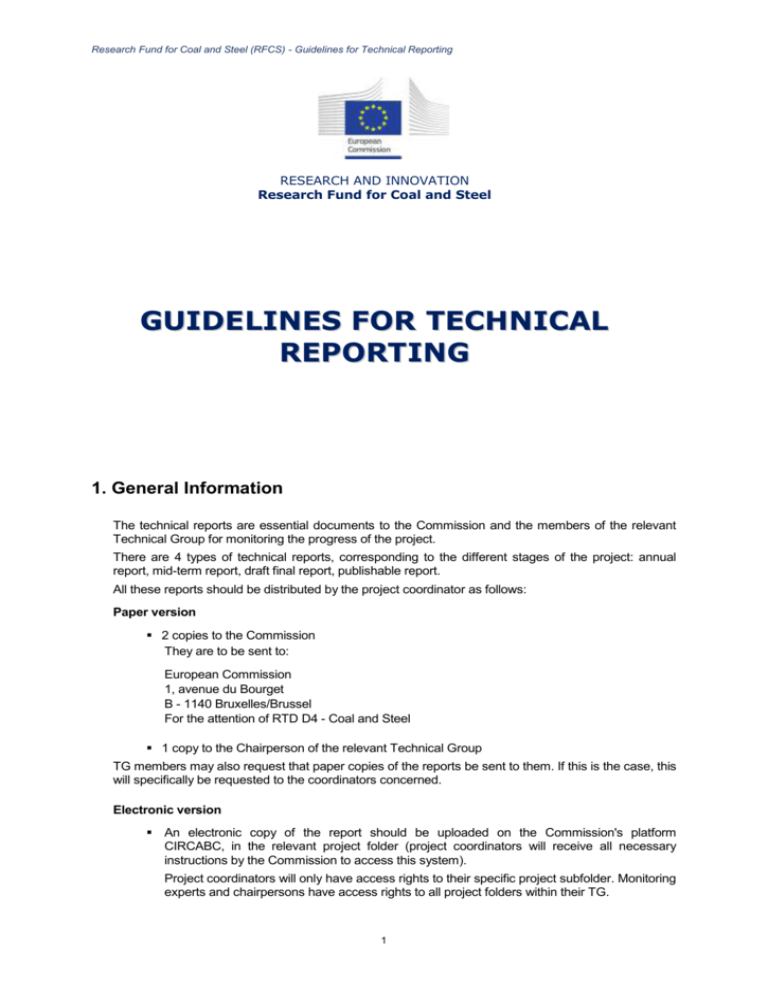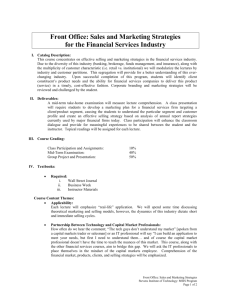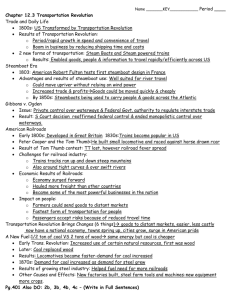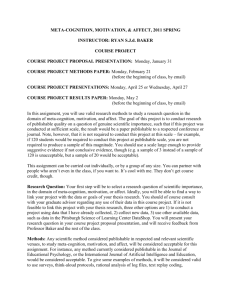Information Package
advertisement

Research Fund for Coal and Steel (RFCS) - Guidelines for Technical Reporting RESEARCH AND INNOVATION Research Fund for Coal and Steel GUIDELINES FOR TECHNICAL REPORTING 1. General Information The technical reports are essential documents to the Commission and the members of the relevant Technical Group for monitoring the progress of the project. There are 4 types of technical reports, corresponding to the different stages of the project: annual report, mid-term report, draft final report, publishable report. All these reports should be distributed by the project coordinator as follows: Paper version 2 copies to the Commission They are to be sent to: European Commission 1, avenue du Bourget B - 1140 Bruxelles/Brussel For the attention of RTD D4 - Coal and Steel 1 copy to the Chairperson of the relevant Technical Group TG members may also request that paper copies of the reports be sent to them. If this is the case, this will specifically be requested to the coordinators concerned. Electronic version An electronic copy of the report should be uploaded on the Commission's platform CIRCABC, in the relevant project folder (project coordinators will receive all necessary instructions by the Commission to access this system). Project coordinators will only have access rights to their specific project subfolder. Monitoring experts and chairpersons have access rights to all project folders within their TG. 1 Research Fund for Coal and Steel (RFCS), Guidelines for Technical Reporting Deliverables Project deliverables are part of the periodic reporting and must be included as an appendix to the reports and/or made available on CIRCABC. For deliverables which are not in the form of a written document (e.g., a new process, a new product, a web site), a description of the deliverable should be provided instead. In any case, a list of deliverables with their due date, realisation date (actual or foreseen), form and location (Annex to report or CIRCABC) should always be included in the report. Note that, for each beneficiary, the second pre-financing shall only be released upon receipt and approval of the following documents: mid-term technical implementation report mid-term financial statement The payment of the balance at the end of the project shall only be released to each beneficiary upon receipt and approval of the following documents: publishable report (due within 3 months of the draft final report approval) final financial statement audit report covering the overall project expenses Failure to submit these documents in due time will result in the suspension of the relevant payment. 2 Research Fund for Coal and Steel (RFCS) - Guidelines for Technical Reporting 2. Annual Reports Annual reports cover the results obtained during the previous calendar year (in case of first annual report, it will cover the period from project’s start, for example 1st July, to 31st December). An annual report is not due for the calendar years in which the mid-term technical implementation report and the draft final report are due. Typical examples of reporting periods are given in Example 4 at the end of the document. The annual report has to be concise and structured as follows. a) Cover page (for layout, see Example 1 at the end of the document). b) Table of contents c) Abstract of maximum 250 words, highlighting the main subjects and conclusions in a comprehensive albeit concise manner. d) Project overview table (see Example 2 at the end of this document). e) Bar chart comparing actual situation with initial planning. f) Table of deliverables, with their due date (according to technical annex), their finalisation date (actual or foreseen), their form (written document, website, workshop etc.) and their location (appendix to the report, other periodic reports, CIRCABC, internet,..). g) A section describing the state-of-the-art (only in case of first annual report). h) Summary: Brief description of the scientific and technical achievements and/or progress for the relevant period, along with any possible corrective actions required (a simple compilation of individual reports produced by partners shall not be accepted). i) A list of acronyms and abbreviations used in the report. j) List of references h) A scanned copy of the signed Technical Annex (Annex I to the Grant Agreement) or its latest signed amended version (if applicable). 3 Research Fund for Coal and Steel (RFCS), Guidelines for Technical Reporting 3. Mid-Term Report The mid-term technical implementation report covers the research work carried out and achievements made during the first reporting period as specified in the grant agreement. It shall be submitted not later than 90 days after the end of the relevant period. It is advisable that the mid-term report does not exceed 150 pages in total (including all appendices or annexes). The structure and the content of a mid-term report are described below and have to be strictly followed: a) Cover page (for layout, see Example 1 at the end of the document) b) Table of contents c) Abstract of maximum 250 words, highlighting the main subjects and conclusions in a comprehensive albeit concise manner. d) Mid-term summary Part 1 - Management and coordination aspects This part describes the management and coordination aspects of the project. Its structure is as follows: 1.1 A project overview (see Example 2 at the end of the document) including information on actual expenditure for the reporting period versus total budget; 1.2 A bar chart comparing actual situation with initial planning; 1.3 Table of deliverables, with their due date (according to technical annex), their finalisation date (actual or foreseen), their form (written document, website, workshop etc.) and their location (appendix to the report, other periodic reports, CIRCABC, internet,..). 1.4 A description of progress made and possible problems encountered, along with corrective actions deemed necessary Part 2 - Scientific and technical progress The report should describe the achievements and/or the progress made for the relevant period, on a task per task basis. A simple compilation of individual reports produced by partners shall not be accepted. The following items should be addressed: 2.1 Specific project objectives for the reporting period; 2.2 Results obtained (per task); 2.3 Preliminary conclusions; 2.4 Publications and patents. e) A list of acronyms and abbreviations used in the report f) List of references g) A copy of the signed Technical Annex (Annex I to the Grant Agreement) or its latest signed amended version if applicable. 4 Research Fund for Coal and Steel (RFCS) - Guidelines for Technical Reporting 4. Draft Final Report The final report is an assessment of the entire project and should be suitable for a comprehensive technical review of the work performed. The entire draft final report should typically not exceed 150 pages in total (including appendices), with a lean core report ideally of maximum 50 pages. Once approved, it is to be re-submitted within 3 months as the publishable report (see next section). The draft final report shall be submitted no later than 90 days from the beginning of the calendar year following the project closing date. The structure and the content of a final report are described below and have to be strictly followed: a) Cover page (for layout see Example 1 at the end of the document) b) Table of contents c) Abstract of maximum 250 words, highlighting the main subjects and conclusions in a comprehensive albeit concise manner. d) A project overview (see Example 2 at the end of the document). e) Final summary (max 10 pages) addressing the most significant aspects on a task by task basis: project objectives, results obtained and their usefulness, conclusions and possible applications and patents. f) Table of deliverables, with their due date (according to technical annex), their finalisation date (actual or foreseen), their form (written document, website, workshop etc.) and their location (appendix to the report, other periodic reports, CIRCABC, internet,..). g) Scientific and technical description of the results This section covers the research approach, a description of the experimental work performed on a task per task basis, highlighting the main results achieved. A simple compilation of individual reports produced by partners shall not be accepted. The section shall contain the following: 1) Objectives of the project 2) Comparison of initially planned activities and work accomplished This part should describe major deviations, if any, from the initial plan and their effects on the project 3) Description of activities and discussion, highlighting any innovation made 4) Conclusions, indicating the achievements made. 5) Exploitation and impact of the research results This section should address issues related to the exploitation of the results, notably: h) Actual applications; Technical and economic potential for the use of the results; Any possible patent filing; Publications / conference presentations resulting from the project; Any other aspects concerning the dissemination of results. List of figures i) List of tables j) List of acronyms and abbreviations k) Full list of references l) A copy of the signed Technical Annex (Annex I to the Grant Agreement) or its latest signed amended version if applicable. m) Appendices 5 Research Fund for Coal and Steel (RFCS), Guidelines for Technical Reporting 5. Publishable Report The publishable report shall be prepared after approval of the draft final report. It should be submitted within 3 months of the draft final report acceptance. 5.1. Content of the publishable report The structure of the publishable report should be identical to the one of the draft final report with the following exceptions: The layout of the cover page must be modified and designed as indicated in Example 3 at the end of the document The abstract must be supplied separately. This abstract will be published on the CORDIS website and in Euroabstracts. The project overview, the table of deliverables, the comparison of initially planned activities with work accomplished and the scanned copy of the Technical Annex must be removed from the report. The only changes in the technical content of the report should be the ones requested by the reviewers during the TG meeting. Condensed publishable reports For research or pilot and demonstration projects requiring a justified level of confidentiality, the Commission may accept the presentation of a condensed version of the draft final report for publication. This should be requested and duly justified for acceptance by the Commission. The condensed publishable report should describe the objectives, work done and results achieved without disclosing details which might jeopardise industrial property rights. Notwithstanding the acceptance of such practice by the Commission, all progress reports (annual, mid-term, draft final) should be complete reports allowing the Commission and the TG experts to make a full assessment of the progress made. Delayed publication of the publishable report The coordinator may ask the Commission to delay the publication of the publishable report to protect intellectual property rights. 5.2. Instructions for the preparation and layout of the publishable report The publishable report must be complete and proof-read as it will not be possible to accept any subsequent changes. The publication office will use the files as they are. The following items must be sent to the Commission: A. B. In electronic format, a CD-ROM containing three files: 1. The publishable report both in PDF format and in MS Word format, with page numbering in the footer, starting with two completely blank pages and numbering beginning at page 3, 2. A file containing the cover page and the 250 words abstract (in MS Word format). In paper version, one print-out in colour of the electronic version of the publishable report with page numbering. 6 Research Fund for Coal and Steel (RFCS) - Guidelines for Technical Reporting The following standard layout is compulsory in view of presenting all reports with a uniform layout. Margins: Font: Top: 13 mm border Bottom: 13 mm border Left: 25 mm border Right: 25 mm border Titles: Verdana bold, underlined, 10 pts Subtitles: Verdana bold italic, 10 pts Body text: Verdana Regular, 9 pts Bullet points: Verdana Regular, 9 pts Typing: Use a normal type for the body of the text (i.e. in general do not use italic, bold or any other type) Alignment: Justified Headers, footers, logos: Do not include any headers, footers whatsoever (no company logos, Grant Agreement or document references, border lines etc.) other than page numbers where applicable. Illustrations, graphics and photographs: Make sure that used illustrations, graphics and photographs are all of good quality and legible, and that they are well positioned with adequate spacing with the preceding and following text. Colours: Colours should be used if it is imperative to demonstrate a point or feature - Try to avoid light colours in the graphics. Page numbering: For the numbered version, insert page numbering on the front of the pages, at the bottom. Pages 1-2 are the cover page, made by the publication office. Please do not number pages 1 and 2, which should be completely blank. Start the page numbering with the table of contents as page 3. Add the final summary immediately after the table of contents (starting on the first odd page after the table of contents). Start every new chapter/part on an odd page (e.g. 5, 7, 9, etc). If you add white pages, do not forget to number them. Table of contents: Prepare it carefully in accordance with the page numbering as it will be printed as it is. Cover page: Please use the exact layout sample given in see Example 3 at the end of the document. Do not include any additional information and logos on the cover page. There is no need to number it as it will be done by the publication office. Save it on the same file as the 250 words abstract. 250 words abstract: There is no need to number it as it will be printed on the back cover of the published report. Save it on the same file as the cover page. 7 Research Fund for Coal and Steel (RFCS) - Guidelines for Technical Reporting Example 1 - Example cover page for annual, mid-term and draft final reports European Commission Research Programme of the Research Fund for Coal and Steel Technical Group: TG… Project Title Acronym Confidential (if applicable) Project Coordinator’s name Affiliation Full Address + (Same details for other authors/other beneficiaries) Grant Agreement number Reporting period: start date – end date Annual/First Annual/Mid-Term/Draft Final Report 9 Research Fund for Coal and Steel (RFCS) - Guidelines for Technical Reporting Example 2 - Project Overview Table Sector (Coal /Steel): Technical Group: Grant Agreement No.: Title: Acronym: Beneficiaries: Start Date: End Date: Period covered by this report: Work Undertaken: Main Results: Future work to be undertaken: On schedule (Yes /No): Main problems encountered: Correction actions: Publications, patents: For Mid-Term and Final reports only: BUDGET INFORMATION PER BENEFICIARY Based on overall costs (independently from EU financial contribution) Total allowable cost (€) BENEFICIARY Total amount spent to as foreseen in Grant (incl. coordinator) date (€) Agreement 11 Research Fund for Coal and Steel (RFCS), Guidelines for Technical Reporting Example 3 - Publishable Report Title Page European Commission Research Programme of the Research Fund for Coal and Steel Technical Group: TG… Project Title Acronym Project Coordinator’s name Affiliation Full Address + (Same details for other authors/other beneficiaries) Grant Agreement number start date – end date of project Final Report 12 Research Fund for Coal and Steel (RFCS) - Guidelines for Technical Reporting Example 4 - Typical reporting periods - examples 24 months project starting on the first of July Jun. 30th Y3 Jul. 1st Y1 Calendar of technical reports and financial statements Other deliverables may be required as described in the projects's work packages 24 months Only one reporting period Project Start Technical Reports 1st Calendar Year 2nd Calendar Year Y1 Y2 3d Calendar year Y3 Y4 March 31st Y2 March 31st Y3 March 31st Y4 Annual (Y1) Annual (Y2) Final (full project) Final (Global) Financial statements 13 Publishable report due 3 months after approval of the Final Report Research Fund for Coal and Steel (RFCS), Guidelines for Technical Reporting 36 months project starting on the first of July 36 months First half-term: Jul. 1 Y1 - Dec. 31 Y2 First Reporting period Project Start Technical Reports Financial statements Jun. 30th Y4 Jul. 1st Y1 Calendar of technical reports and financial statements Other deliverables may be required as described in the projects's work packages Second half-term Jan. 1 Y3 - Jun. 30 Y4 Second Reporting Period 1st Calendar Year 2nd Calendar Year 3rd Calendar Year Y1 Y2 Y3 4th Calendar year Y4 Y5 March 31st Y2 March 31st Y3 March 31st Y4 March 31st Y5 Annual (Y1) Mid-term (Y1+Y2) Annual (Y3) Final (full project) Final (Y3+Y4 & Global) Mid-term (Y1+Y2) 14 Publishable report due 3 months after approval of the Final Report Research Fund for Coal and Steel (RFCS) - Guidelines for Technical Reporting 42 months project starting on the first of July Dec. 31st Y4 July 1st Y1 Calendar of technical reports and financial statements Other deliverables may be required as described in the projects's work packages 42 months First half-term: Jul. 1 Y1 - Dec. 31 Y2 First Reporting period Project Start Technical Reports Financial statements Second half-term Jan. 1 Y3 - Dec 31 Y4 Second Reporting Period 1st Calendar Year 2nd Calendar Year 3rd Calendar Year Y1 Y2 Y3 4th Calendar year Y4 Y5 March 31st Y2 March 31st Y3 March 31st Y4 March 31st Y5 Annual (Y1) Mid-term (Y1+Y2) Annual (Y3) Final (full project) Final (Y3+Y4 & Global) Mid-term (Y1+Y2) 15 Publishable report due 3 months after approval of the Final Report Research Fund for Coal and Steel (RFCS), Guidelines for Technical Reporting 16






